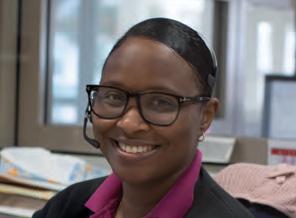
















At a distance, BMA House is just a building on the corner of Victoria and Parliament. You may walk past it every day, but did you ever wonder what it is like inside? Well, each day is different, but for today, we will focus on three letters: DEI. Here is a snapshot of DEI through the lens of the BMA.
Let us get started! If we zoom in through the front doors and past the reception and elevators, you may see staff in the lunchroom warming favourite dishes from their home countries—locations that span the globe. The BMA is proud of our blended staff, which consists largely of Bermudians alongside highly skilled individuals from over 30 countries. Therefore, when possible, we celebrate this cultural diversity through gatherings such as potlucks, where staff can share a little taste of home with coworkers.
The BMA’s diversity shines through differently each day. For instance, on International Women’s Day, we capture plenty of purple—purple shirts, pants, dresses, shoes, and Women play a prominent role at every level. This starts at the Board where a third of members are female and many serve in leadership positions, such as our Board’s Deputy Chair and three of our Board Committee Chairs. This runs through the rest of the organisation, across all levels of leadership and into each department, with over half of our staff being female. We also have diversity of age—from Generations X, Y and Z to Baby Boomers—creating a powerful mix of deep experience and expertise alongside fresh perspectives.
we refocus the lens, you will see that, at the BMA, we do not just want staff to come to work each day, do their job and go home. We want them to have a strong sense of belonging, purpose and inclusion. To create an environment that fosters this, we actively invite and value the authentic voices of our diverse workforce— for instance, our annual strategic planning process. The annual planning starts with an all-staff call to action, where departments host discussions with staff at every level to listen to a range of perspectives and insights on where the BMA should focus.
There is also a lot more to the ‘I’ in our DEI approach. If we ride the conference room. Now, focus in on the employee behind his computer in the corner. His screen shows how we are enhancing our broader inclusion efforts as he works through modules that target resilience, well-being and self-awareness, which is part of
our newly launched training on psychological safety. This is the belief that, regardless of your lived experiences, you can freely share your thoughts, opinions and ideas without the fear of being degraded or shamed. His manager, a few desks down, is working through modules that teach her how to create a trusting and empowering environment where everyone can participate.
We endeavour to ingrain this mentality across our operations and cross-functional, diverse working group supports management in its role to adopt and embrace our aspirational culture. The CIT itself is diverse, with two-thirds of the team being people of colour and two-thirds female. It is also a space where we search for avenues to include these diverse voices. But, why tell you when we can show you. It is nearly time for CIT’s 2 p.m. meeting. Let to see staff at all levels, from the
our Graduate Trainees, sitting at the same table to share ideas and insights. We are excited to offer this opportunity for participation at a broad level, particularly to those just entering the workforce. For example, through our Graduate Training Programme, we offer recently graduated Bermudians a seat at the table to learn and contribute their perspective within the BMA and through industry and peer regulatory secondments.
Participation, however, is just a pathways that allow our colleagues to reach their full potential. For some, this requires access to
and equity. If we walk down the hall, we may be able to also catch a glimpse of one of our Assistant Directors working to develop
Up. This is a truly comprehensive offering where employees coaching to cross-departmental secondments. For a snapshot of one of the BMA’s more targeted equity measures, as we walk
Following the pandemic and job losses that the island experienced in its wake, we created a new community–focused programme through which unemployed Bermudians could apply to be hired and trained in an entirely new set of skills, and tangibly contribute to helping our community recover.
This should give you a good picture of the BMA’s DEI path to date. As the landscape changes, we will continue to adjust our lens to focus on DEI in a way that drives our success as individuals, as an organisation and as a community.
 Pictured Alayon, Kelly Gilmour, Taijaun Talbot.
Let us adjust the lens to give you
Pictured Alayon, Kelly Gilmour, Taijaun Talbot.
Let us adjust the lens to give you
aclearer snapshot of Diversity, Equity and Inclusion (DEI) at the BMA.










The Association of Bermuda International Companies (ABIC) hosted a workshop to highlight the benefits of neurodiversity in the workplace. The June 15 event, which featured neuroplasticity expert Julia Harper, PhD, was part of ABIC’s drive to promote diversity, equity and inclusion (DEI) in Bermuda’s International Business (IB) community.
Neurodiversity describes variations in brain function that cause an estimated one in seven people to learn, communicate and behave differently from the neurotypical majority. Research has shown that neurodiversity in the workforce can improve productivity, profitability and talent retention.

Companies like Google, Amazon, EY and Deloitte, have adapted hiring processes and career development programmes to attract neurodivergent individuals, who include those with autism, dyslexia, ADHD, dyspraxia, and social anxiety disorders.
Research shows that many neurodivergent people have higher-thanaverage abilities, especially in pattern recognition, memory, or mathematics, yet they are more likely to be unemployed than neurotypical people. Employers who invest in a supportive environment to attract and develop untapped neurodivergent talent stand to reap performance rewards.
ABIC’s DEI Committee has hosted sessions on topics like Bermuda’s employment data, Black women in IB, advancing racial equity and inclusion in IB, employee wellbeing and mental health, and the inclusion of LGBTQ+ employees.

ABIC incubated and continues to support the Association for Corporate Racial Equity (ACRE), which advocates for racial equity in Bermuda’s IB sector, and WeSpeak, which supports women’s professional development. ABIC believes that having a diverse IB sector at all levels is critical to Bermuda’s relevance and continued success.


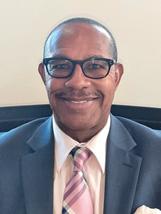
meetings might happen at the water cooler.
Water is great tasting and an environmentally responsible choice. It is essential to get proper hydration to maintain your body’s mental and physical performance.
THE DEPARTMENT OF WORKFORCE DEVELOPMENT is here for you!

Our business is committed to maintaining a welcoming and safe environment for clients and customers, visitors, vendors and race, ethnicity, nationality, sexual orientation, religion or disability.






As an international coeducational school with strong historical and civic connections to Bermuda’s community, one can consider Warwick Academy as a “melting pot” or fusion of different people of various backgrounds, races, religions, cultures, and languages. This fascinating jewel of an educational institution recognises the importance of enhancing its understanding of Diversity, Equity, Inclusion, and Belonging (DEIB) for continued growth. It must be noted that Warwick Academy has recently celebrated its 10-year anniversary of our Human Rights Project which is student led and runs in parallel to our DEIB initiatives.
Thus, we are making strides to delve deeply into exploring the etiology of past inequalities and challenging current ideologies that maintain barriers to acknowledging the work that must be done and accepting that each stakeholder has a role to play regarding all matters relating to race, gender, sexual identification/orientation, age, ability, social economic status, and religion. While this is an immense task, the desire to tackle these globally and locally heightened issues is what Warwick Academy is attempting to do with purpose and strategy.
On the heels of the Black Lives Matter Movement, which accelerated Diversity, Equity, Inclusion, and Belonging in many workplaces around the world, Warwick Academy is genuinely attempting to embed this ethos into the culture of the school. To that end, there have been numerous initiatives that have been implemented to create an authentic safe space of belonging.
From 2019 to 2021, Dr. Vernee Butterfield, who is known locally and internationally and provides workshops on the topics of discriminatory educational, curriculum theory and culture, and social justice leadership, facilitated our initial staff and student training in understanding what defines a racially equitable school and implicit bias.
This year, we have had Dr. Jade Templar from Solstice Ltd., and Mrs. Stacey-Lee Williams of Citizens Uprooting Racism in Bermuda (C.U.R.B.) provide full staffing training on “Becoming Explicit about Implicit Bias” and “Let’s talk about Equality: A Psychological Perspective of the Wellbeing of the school”.
Additionally, our school was blessed to have an interactive presentation with Mr. Christo Brand, who was the late Nelson Mandela’s prison guard while on Robben Island. Mr. Brand’s inspiring depiction of his relationship with Nelson Mandela and the loving character exhibited by this “Champion of Peace” provided a powerful glimpse of what racial harmony amongst individuals of diverse backgrounds can look like amid dire circumstances.
Bermudian Historian, Mr. Corey Butterfield has enthusiastically engaged our students about Bermuda’s culture during our Multi-Cultural Day. We have also had Dr. Quinton Sherlock share his experiences as a Bermudian living in Ghana and Bermuda’s transatlantic history. Finally, on the training front, our Year 10 students participated in a Racial Healing event facilitated by C.U.R.B. with students from other schools. This powerful gathering of students and presenters, featuring Kristin White and other presenters, exposed our students to the rich history of Black Bermudians and gave students the opportunity to voice their opinions to increase racial harmony.
To organise and manage our initiatives, Warwick Academy created its initial Diversity, Equity, Inclusion (with Belonging added in 2023) Committee in 2020. This committee carried out the directives from the school’s leadership, and was comprised of Board members,

staff, and parents. This committee has evolved into a fully functioning and autonomous DEIB staff committee with a parent/stakeholder sub-committee to commence in the next academic year. Lastly, to further aid in directing our DEIB efforts, a new position of Head of Diversity, Equity, Inclusion, and Belonging was established. One of the main responsibilities for this role is to develop the DEIB strategic goals and objectives, and support school leadership, teachers, and non-teaching staff with managing issues related to discrimination of any type.
With a progressive and supportive school leadership, an operating staff committee, and a designated role to direct the DEIB initiatives in place, Warwick Academy has also infused culturally diverse content into its Humanities and English Department’s curricula since our 2019 audit. While more sources are needed, particularly for Bermuda’s history, Warwick Academy has increased its learning units on early African Kingdoms, slavery, its abolition, and civil rights. In our Global Citizenship classes, students explore local and global issues relating to rights and freedoms, languages and communication, and the impact of globalisation. The English Department has also increased their literature range from Black authors, and students have been able to study the writings of Dr. Martin Luther King and Maya Angelou and lyrics of rap artists, such as Kendrick Lamar.
One would be naïve to think that with all these initiatives in place that Warwick Academy is a utopian inclusive environment. While we are moving in that direction, there is still much work to be done. Enhancing our awareness and actions to illustrate a true sense of belonging for all our students, parents, and staff members is our goal. Belonging can only manifest itself through vulnerable dialogues and taking deliberate actions regarding all matters relating to race, gender, sexual identification/ orientation, age, ability, social economic status, and religion. Warwick Academy is more than a place of learning, and like any other family and community there is always room to work out our differences through openly encouraging interaction and constructive discussions.
Using appropriate pronouns and inclusive language respects gender identity and creates a more inclusive, welcoming environment
British Airways recently said it will drop the phrase “ladies and gentlemen” in its public announcements. And it’s not the first airline to switch to using more inclusive language. Air Canada, Japan Airlines, Lufthansa and others have all committed to eliminate gender specific references, and use phrases such as “dear guests”, to ensure that all customers feel welcome.
Pronouns play a crucial role in language, serving as valuable tools for communication and conveying identity. They provide a convenient way to refer to individuals without constantly repeating their names. In recent years, the use of pronouns has gained increased attention, especially in the context of gender identity and inclusivity. Today, it is not uncommon to see individuals adding pronouns such as "she/her" or "he/him" to their email signatures in the business world. This practice reflects the growing recognition of diversity and inclusivity in professional environments.
Pronouns serve as linguistic markers that identify an individual's gender in language. Traditionally, gendered pronouns like "he" and "she" have been used to refer to people based on their perceived biological sex. However, as society becomes more aware of the fluidity and complexity of gender identities, it has become essential to adopt inclusive language practices. This is particularly important in the business world, where individuals from diverse backgrounds and experiences come together to collaborate.
Including pronouns in email signatures is a simple yet powerful way to show respect and support for gender diversity. By openly sharing their preferred pronouns, individuals create a more inclusive and welcoming environment for colleagues, clients, and stakeholders. It helps avoid making assumptions about someone's gender identity, thus reducing the potential for misgendering or causing discomfort.
“I add my pronouns to my e-mail signature to ensure people know how to address me based on how I view myself”, says Angie Tran, video producer and client relations manager at Bermuda Media. “It’s accepting people for who they are and how they show up. Part of that is addressing them by the pronouns of their choice”. And Kevina Lorae A. Santucci (she/they), a life coach and sex educator who specialises in intimacy, relationships and self-care says that “choosing to honor someone’s pronouns is a simple act of kindness that can have a profound impact on their well-being.”
Incorporating pronouns in email signatures goes beyond mere symbolism. It demonstrates a commitment to fostering an inclusive workplace culture and embracing diverse perspectives. When someone includes "she/her" or "he/him" in their signature, it serves as a signal that they are conscious of the importance of gender inclusivity and are actively promoting it. This gesture encourages others to follow suit, creating a ripple effect throughout the organisation.

In the business world, where networking
and relationship-building are crucial, using inclusive language can have far-reaching positive effects. When clients, customers, or business partners receive an email with pronouns in the signature, it signals that the sender values diversity and is considerate of individual identities. This can enhance trust, strengthen relationships, and even lead to new opportunities. Moreover, it sets a precedent for other organisations to adopt similar practices, contributing to a broader societal shift towards inclusivity.
The inclusion of pronouns in email signatures also benefits transgender and non-binary individuals. These individuals may face unique challenges in professional settings, such as misgendering, discrimination, or a lack of visibility. By openly sharing their pronouns, they can assert their gender identity and feel more empowered and respected within their workplace. This small act can help create a supportive environment where everyone's gender identity is acknowledged and respected.
While the inclusion of pronouns in email signatures is a positive step towards inclusivity, it is important to recognise that not everyone may feel comfortable sharing their pronouns openly. Gender identity is a deeply personal aspect of one's identity, and individuals should have the freedom to disclose or not disclose their pronouns as they see fit. Respect for individual choices and preferences is crucial in creating an inclusive workplace culture.
In today's business world, openly sharing pronouns promotes gender inclusivity, fosters respect, and creates a welcoming environment. It also sends a powerful message about the organisation's commitment to diversity and inclusion. By embracing inclusive language, businesses can build stronger relationships, enhance trust, and contribute to a more inclusive society.
Tracey Gibbons has learnt a few harsh lessons over her long and successful career.
“When I was more junior, I could be in a meeting and talk about something and I’d get shut down,” Gibbons recalls about her early days breaking into the insurance industry four decades ago.
“A man would say exactly the same thing and people would say, ‘Oh my goodness, that’s a great idea.’”
Gibbons, now the head of QBE Re Bermuda, found the only way to ensure her voice was heard was to stand up for herself.
“When I was younger, I thought that if I was really good at what I did and I made the company money and I was consistent and reliable and always volunteered and stepped up that it would be recognised. That’s not always the case,” she says.
“You have to toot your own trumpet sometimes and just say, you know, I’ve done that.
“It’s happening less now because I’m often the most senior person in the room. But now, if I see that happening to someone else, I’m motivated to speak out and say, ‘They just said that.’”
“I think one of the reasons I’ve succeeded in the industry is that I’m not scared to speak my mind.”
Gibbons joined QBE Re two years ago partly because of its progressive approach to diversity, equality and inclusion.
Since then, the company has launched an Inclusion and Diversity Policy and is on target to increase the number of women in leadership from 35 per cent to 40 per cent by 2025; women at the board level has already risen to 44 per cent. QBE also has targets in place on ethnicity, disability and LGBTIQ+.

Those difficult early experiences make Gibbons an ideal role model for young women trying to climb the ladder.
“I’m lucky I have succeeded but I know
how hard it was for me,” she says.
“I often wonder, if I was a male, where would I be now or how much more quickly I would have got into this position.”
She sits on the board of educational mentoring group Women in Reinsurance and the ABIC Diversity and Inclusion Committee, is an active speaker on DEI and acts as a mentor to many young people.
“A lot of people reach out to me on LinkedIn because they want to get into the industry or they’re at an impasse and they’re not sure what the next step is,”
Gibbons says. “I’ve never declined to meet anyone for a cup of coffee.
“When I started, there was nobody who looked like me to look up to. You look at it now, we’ve made so much progress. There are so many females in very senior positions, but we need to do that for all types of diversity and we’ve still got a long way to go for women. QBE is committed to making progress in this area.”
QBE aims to create a pipeline of quality individuals for senior roles by recruiting diverse candidates at all levels. During interviews, hiring managers
are mindful not to “favour the person who’s similar to you” and look beyond outward confidence in interviews, which has historically given an advantage to privately educated candidates.
“I’m looking for the rough diamond,” Gibbons says.
“This whole process has to start at entry level, identifying the high potential individuals from a diverse background and supporting them as they learn and grow.”
QBE conducts training on discrimination, bullying and, in Bermuda, the racial history of Bermuda, while staff are encouraged to be their authentic self at work; the company will also be a “Rainbow Sponsor” for this year’s Bermuda Pride month.
The biggest challenge moving forward, Gibbons believes, is education.
“There are a lot of people who go along with the whole DEI thing because they have to, but then they hire people who look and think the way that they do.
“If we could educate people and convince them of the benefits of having a diverse workforce for themselves, for employees and for society as a whole, I think that would be a big step in the right direction.”
Gibbons advises young people to initially look for jobs that provide them an opportunity to learn and where senior colleagues are willing to teach them.
“Reach out and make sure you have at least one good mentor,” she adds.
“The big thing that was missing for me was having a champion, that is someone who will put you forward to do things, or promote your capabilities within the company.”
BIO: Tracey Gibbons is head of QBE Re’s senior underwriter and manager with extensive experience as a mentor, coach and champion to individuals. She sits on the board of Women in Reinsurance, a networking and educational organisation for women working in the reinsurance industry, and is a member of the Association of Bermuda International Companies’ DEI Committee. In 2015, she in the insurance industry by Intelligent female executives in Bermuda by Bermuda Re and ILS Magazine. She was given the “Women to Watch” award by Business Insurance Magazine in 2019.
In the early days of her career, Gail Marshall was told a woman couldn’t handle a jackhammer or do heavy lifting.
After spending 30 happy years in the construction industry, it’s fair to say she’s proved them wrong.
Marshall started off in the same way as so many young people: a single mother simply trying to earn money to take care of her daughter.
The difference was that Marshall, who had always been intrigued watching masons create something out of nothing, decided to try her luck in an industry dominated by the opposite sex.
There were doubters among her male colleagues in her first job as a subcontractor at the Hamilton Princess.
“They saw the jackhammer and said, ‘Oh, you can’t handle it,” Marshall says.
“I proved them all wrong. I did it. I did
it better. One of the guys tried to handle the jackhammer and he didn’t last 15 minutes. He quit. I ended up doing the work myself.”
Marshall quickly learnt that by showing a good work ethic – and taking no nonsense from the men – she was able to earn respect and carve out a successful career.
She became a superintendent at construction firm BCM, running all the jobs in the field and dealing with disciplinary action, and worked on numerous major projects including the King Edward VII Memorial Hospital rebuild, Bermuda airport, Washington Mall, the AS Cooper building, Sandys 360, Ariel Sands, the Team Oracle base at the America’s Cup and many more.
Now 54, Marshall is a co-owner of Atlantic Millwork & Maintenance carpentry shop in Pembroke, where she

combines management and business skills with old-school tasks like woodburning.
During the past three decades, Marshall has been pleased to see more women enter the industry.
“Today, there’s a lot of women – I think that’s great,” she says. “I think the women know if you put your mind to it, it’s not just a man’s world. It takes a lot of dedication and sweat and tears. But if you are strong, you can do it.”
In addition to sexism, Marshall has had to contend with homophobia.
“Being a gay woman, you get that thrown at you,” she says.
“It never fazes me. I love who I am. I’m not afraid of what people think. I don’t care what people think. That doesn’t pay my bills.
“You have got to learn to hell with people. They don’t make you happy at the end of the day.”
One of her fondest memories is the time large kites went on display at Bermuda airport while Marshall and her team were on site. Among them was one proudly displaying a rainbow design.
“My guys said, ‘We need you to come outside and see this. This kite is for you.’ They just loved it,” she recalls.
“There are so many young guys that call me mom and show me the utmost respect. My respect was always there for them. I tell them the only thing I expect from you is respect.”
Marshall is thankful for the opportunity she received from Mike Ewles and Alan Burland at BCM, and furthered her chances by undergoing every course going at Bermuda College, from masonry to health and safety.
“You have to make sure you’re qualified, and you have to love your work, no matter what you do,” she advises.
“You get a sense of pride just by knowing you are doing what the guys do. Nobody’s given me a handout. I worked with a jackhammer, from the bottom, all the way up.
Her advice to any young women thinking about joining the construction industry?
“Like Nike says, just do it. Follow your dreams. Don’t be discouraged. Believe in yourself. Take pride in what you do and take time to learn new skills. If you do that, you will be set for life. One day you will have your own company.”
If you want to foster a culture of innovation at your business, you need to cast your net wide as you recruit new talent.
Aon Bermuda has done exactly that through an intentionally open hiring process that has welcomed people with previous careers in banking, accounting and retail.
“We have hired from different industry sectors across Bermuda,” says Giles Harlow, managing director of the New Ventures Group at Aon Bermuda.
“This industry is not rocket science. It’s very specialised, but it’s absolutely something that can be trained.”
Harlow’s team includes one person recruited from the Milan Milan Italian lifestyle store in Hamilton, and another with a degree in criminal justice.
“She was very used to juggling multiple complex cases at the same time,” Harlow explains. “So she has the transferrable skills she needs to manage multiple accounts.
“I would like to peel back the onion a bit more when it comes to resumes in previous jobs – go a bit deeper to understand what those transferable skills might be, especially for those people looking for a career shift.
“Take a second look at something that might not be immediately obvious to the hiring manager. There’s some great talent out there.”
Such a process, of course, leads to a more diverse workforce, which Harlow believes can address an innovation gap within the insurance industry.
“There’s a positive correlation between DEI policy and innovation,” he says. “Hiring diverse teams helps us to close that innovation gap.
“We want to avoid being like an echo chamber and group thinking. We have
been very focused to ensure we are getting a diverse team and not falling into any of those traps.”
One of the biggest traps in Bermuda’s international business circles is that predominantly white men have hired people who look like them for key roles.
“Probably the biggest thing I have observed is that when people are looking to replace staff, it’s easier to look at those who are already in the industry and from the same set because it means they can avoid training,” Harlow says.
“It’s something we have absolutely tried to avoid here. On a number of fronts, we have been trying to address a lot of that.”
Aon’s methods have included hiring technology to eliminate bias in job adverts that might turn off certain candidates, and setting up internship programmes to help young Bermudians get a foot in the door.
DEI training is provided, staff are encouraged to make individual pledges, a DEI council holds regular meetings and breakfasts are held to enable staff from different sections to mingle.
“I look at the employees we have here in Bermuda – employees from all over the world in the same building across three floors,” Harlow says.
“We are doing a lot more to integrate the groups so we get different ideas as a committee.”
This approach makes Aon more attractive to new recruits.
“Everybody has a lot of choice these days,” Harlow says. “People have more choice working for somewhere that follows that culture of diversity. It’s not necessarily the dollar amount people are looking at when they want to move.
“Aon promotes from within. People want to join Aon because it recognises
that and it’s very good at nurturing employees.”
Harlow can reveal first-hand that it also makes Aon a better place to work.
“It’s wonderful,” he says. “It’s really fun actually when we sit down in a meeting and people are firing off different experiences and expressing different viewpoints.
“You might think you already have the
right answer, and someone comes out of the blue and says something completely different.
“It really resonates when that’s a viewpoint I hadn’t considered and everyone gets on board with it. That keeps it interesting.”
Ltd. He started his career in the UK and moved to Aon Bermuda in 2012 where he has been instrumental in the design, development and build out of innovative intangible risk transfer products both within the Bermuda market and globally.
Mr Harlow joined Aon in 2009 and holds a Masters of Arts (Hons) from the University of St Andrews.


when

Over the past year, Argus has made great strides to promote racial equity in our workplace, to empower our leaders to address unconscious bias and to raise awareness of structural racism
As we continue this journey, we affirm our commitment to being transparent, authentic and a force for positive change in our workplace and community
Improving workplace equity is not a linear path. Since the Black Lives Matter (BLM) movement in 2020 sparked a global call to fight systemic racism, we have turned inward as an organisation to examine our own culture and bias. Under the guidance of our senior leadership, we have embraced diversity, equity and inclusion (DE&I), implementing tangible goals and initiatives to affirm our commitment to create an equitable workplace for all.
Last year, when we first contributed to this publication, we were at the start of our journey of developing a programme that focused on fostering DE&I at Argus. As a part of this, we recognised the importance of first addressing the specific needs and experiences of the black community.
After a period of thoughtful reflection and discussion, we have now renamed our BLM committee, Belong BLAC (Black Leaders and Allies for Change) and have been actively implementing initiatives, programmes, and actions aligned with our ambitious manifesto, mission, and objectives to drive meaningful change.
From anti-racism training for all employees to our Argus DE&I Library, all our initiatives and activities drive our mission of building an equitable workplace, attracting and supporting
diverse talent, and fostering a culture of belonging with a focus on black individuals. We strive to take a deliberate approach, with clear and measurable goals, firm commitments from leadership, and a willingness to adapt and learn as we continue this process.
Our Black History Month celebrations this year reflected this intentional approach. We recognise that racial inequities and bias manifest uniquely in different cultures and locations, and as a business which operates in multiple jurisdictions, we need to be attuned to the needs of our local cultures and communities.
Our events this February in Bermuda included a Freedom Tour in Hamilton with Titan Tours; Generational Wealth Presentations by Argus’ Education & Investment Manager, Angela Joell; Beyond Seascapes: Black Art in Bermuda, a presentation by Unchained on the Rock; and the launch of our new DE&I Library.
Over 100 participants attended, including staff and members of the community. We received insightful feedback from our colleagues, which we look forward to applying towards future programmes.
As we work to change our internal culture, we’ve been actively collaborating with external partners to develop a set of initiatives within Argus which enable us to create productive and courageous spaces, to have more meaningful conversations about race.
Our Reverse Mentoring Programme rethinks the traditional mentoring dynamic, empowering our black employees to become mentors to nonblack colleagues. Through one-on-one conversations, employees will work
together to develop a culture of empathy and create tools for change together.
Earlier this year, we had the honour of hosting Dr. Robert Livingston, a Harvard social psychologist and a leading expert on combatting bias and racism in organisations. He led four training sessions with the Argus Board, executive leadership team and people managers.
Our leaders underwent training using Dr. Livingston’s PRESS model, a sequential framework and roadmap for working towards racial equity in an organisation through incremental steps. His model suggests, first, companies must build an organisational consensus that a problem exists, understand the underlying issues, develop empathy, and then create strategies to implement change.
As we continue this journey, it’s abundantly clear that DE&I is not a single event, initiative, or effort. Rather it’s a core value of our company to deliver real, substantive change for our people, clients, and community. We’re committed to our DE&I journey which requires ongoing effort, continuous learning, adaptation and, most importantly, courage from all individuals involved.
"Improving workplace equity is not a linear path. We have turned inward as an organisation to examine our own culture and bias.”
At Argus, we believe that racism in all forms is unacceptable and must be actively dismantled in our workplace and beyond. We recognise that black individuals have historically been and continue to be disproportionately impacted by discrimination and systemic oppression, and it is our responsibility to actively work towards dismantling these systems.
We seek to implement anti-racist policies and practices in our workplace, including but not limited to hiring and promoting black individuals, implementing anti-racism training for all employees, and creating a safe and inclusive environment for black employees.

We also recognise the importance of amplifying black voices and perspectives and commit to actively seeking out and elevating the contributions of black individuals within our organisation.
We will not be silent in the face of racism and discrimination, fostering a zero-tolerance environment. We will speak out against it and hold our colleagues, leaders, and partners accountable. We will work to create a more equitable and just workplace for all, particularly for black individuals. Our journey will not be easy, but we can and will
Bermuda Electric Light Company Limited (BELCO) remains committed to creating and supporting a diverse, equitable and inclusive company culture. It’s a commitment we have made to our entire team and the Bermuda community which we believe creates a more just society, and engaged, highperforming workforce. We continually assess our performance in maintaining the highest standards of ethics and integrity in our relationships with our team, our community, and our customers, while ensuring compliance with all applicable laws and regulations.
BELCO continues to have representation on a Diversity and Inclusion (D&I) Council. The global Council was formed to unite representatives from across the globe with the goal of developing, refining and taking the lead on the path to a more DE&I centric approach. The Council is mandated to provide informed leadership for cultural equity and to promote equal opportunity within the workplace. Our participation on this Council is assisting BELCO in strengthening the foundation in order to develop and implement the appropriate programmes to maintain and enhance DE&I issues across our business.
We recognise that we have a social responsibility to our community and our team to develop and enact policies that support Diversity, Equity, and Inclusion (DE&I). With a team of 234 employees, we strive to continuously evolve our DE&I approach to ensure every team member knows that they are valued; receives fair and equitable treatment; has a voice that can be heard; and understands they belong. An investment in a DE&I-centric approach makes good business sense as it builds a team that delivers better business results and creates a stronger, more resilient organisation.
One of the areas we are continuously trying to improve, and are making steady progress, is increasing female representation within our Company
and industry. While the physical work operating the plant and maintaining the distribution grid has traditionally been dominated by men, women are increasingly filling these roles and excelling. Of the 234 full-time employees at BELCO, 44 are women which is a 26% increase in the last year. Women work in almost every area of the Company including Bulk Generation; Transmission, Distribution and Retail; Occupational Health, Safety & Environment; IT; Sustainability; Procurement & Logistics; and Communications with one of our two Managing Directors being female. Additionally, our senior leadership team is 40% female and our Electricity Supply Trade Union (ESTU) has a female President for the first time in its history. We will continue to ensure there are opportunities for women to join our team and increase female representation at all levels and in all areas of our Company. At BELCO, we strongly encourage women to apply for careers, scholarships, internships, and apprenticeships. Of the 19 apprentices currently working for the Company, one is a young Bermudian female. Upon completion of our Apprenticeship Programme, she, along with all the apprentices, will be placed in a designated area of the
business deemed most suitable, which will include potential positions such as Electrical Fitters, Mechanical Fitters, Line Workers and Electrical Jointers. Additionally, BELCO has recently hired 13 summer interns of which half are female.

BELCO’s Director, Human Resources and Culture, LaKeitha Cunningham shared: “BELCO has always been a Company which treats staff like family. We continue to enhance our DE&I policies and initiatives and are seeing tangible changes and benefits in the Company. As we move towards a sustainable future, we remain committed to learn and implement new strategies to improve. Our DE&I centric approach has assisted in attracting and retaining top talent, while also ensuring our customers are receiving excellent service.”
BELCO’s ongoing DE&I journey demonstrates our commitment to a more sustainable future. As we strive to continuously evolve and progress, we will seek out and implement further opportunities for growth and improvement. We are proud of the progress we have made and continue to make and look forward to a more diverse, equitable and inclusive company culture and workforce in the future.
With 30% of the population from other countries, Bermuda is becoming a truly multicultural island
Kuda Manungo has become so Bermudianised, when he goes home to Zimbabwe he greets complete strangers with a cheery: “Good morning.”
This spontaneous friendliness, he says, means he gets a few odd looks in the conservative southern African country where people generally keep themselves to themselves.
Fourteen years of experiencing the Bermuda culture every day tends to do that to people who came to these shores as foreigners but then became an
ingredient in the melting pot themselves.
Manungo, 44, who arrived on the island as an air conditioner and refrigeration technician with AIRCARE in 2009, is one of more than 19,000 foreigners currently living here: about 30 per cent of the total population.

And while traditional sources of immigration – the UK, North America, the Caribbean, the Azores and increasingly the Philippines – make up more than half the foreign population, the list of nations grows longer by the year.
Census data shows 57 Zimbabweans were living in Bermuda in 2016. Similar numbers were recorded from China, Ecuador, Brazil, Switzerland, Japan, Austria and Mexico.
From Azerbaijan to the Falklands Islands, from Tonga to Burkina Faso, from Kiribati to Iceland, our 21 square miles are populated with people from just about every far-flung corner of the globe.
According to Manungo – as well as Bermuda residents originally from China, Japan, Argentina and Thailand
who spoke with us for this article – the key to settling is a combination of integrating into the local community while retaining relationships with fellow natives who share similar likes and culinary habits that remind them of home.

Embrace each other’s cultures and celebrate our differences, in other words. And in doing so they’re helping shape the ever-evolving dynamic of this multinational island.
When Manungo arrived in Bermuda, he quickly realised he had come to a less
conservative place.
“In Bermuda, you might see a boyfriend, maybe in his 20s, living or sleeping over in the girlfriend’s house which is actually the parent’s house, and the parents are happy for their daughter’s boyfriend to be there,” he says.
“We don’t do that in Zimbabwe! That’s a cultural thing. It was unbelievable at first but now it’s just funny because I’ve seen it and I know it happens. But it was shocking to see in the first place.”
That’s not the only thing that surprised Manungo.
“When you come in you quickly notice the differences in culture,” he says.
“I’ve noticed Bermudians talk to strangers. They can just meet you, sit with you and talk with you for 10 or 15 minutes.
“Back in my country you start feeling a little bit suspicious when people do that. Why is this person talking to me? What are they trying to take from me? What do they see?”
What began as a quirk, however, soon became normal.
“Now I do the same,” he says.
“At home, just to talk to somebody at random is not that normal. So, when I go home and I greet people, they assume they know me and just greet me back. Then they look back and say, ‘Huh, who is this guy? I can’t remember this guy!’”
Luisina Medran, 28, a senior, in the audit practice at KPMG in Bermuda, came from Argentina 18 months ago and was taken aback by the level of helpfulness from her new fellow residents.

“My boyfriend and I bought a big barbecue and we were trying to carry it on the bike,” she recalls.
“We tried for two minutes with the bike – it was impossible! There was a lady with her mom who saw us struggling and they decided to help us. They put the barbecue in their car and brought it to our place.
“It was really weird because if that happened at home we would think, ‘That’s our barbecue. Someone else has taken it.’
“It was really nice.”
It’s all very different to living in a big country.
Dan Zhu, an actuary from China who previously worked in Paris, came to
Bermuda five years ago in her late 30s.
“In a big city, nobody will say anything to you. But this is a small community and once you break ice you can make a conversation very easily with everyone,” says Zhu, who works for Arch Reinsurance.
“The local people are very friendly. This place is so special and reminds you how lucky you are and how grateful you should feel.
“For example, you never worry when you walk down the street. You can’t do that when you live in Paris or New York.”
Kota Nagasawa, 24, from Japan, who arrived last year after a spell in New York, agrees on the friendliness.
“People on the island honk their horns on the street,” says Nagasawa, a senior, in the advisory practice at KPMG in Bermuda.

“In Japan that’s considered a very rude thing. You don’t honk unless there’s an emergency. You just don’t do it.
“In the US people do it when they’re annoyed. Here, it means hi. It’s just funny for me. It tells a personality. Bermuda people always want to connect with someone. It shows the character of this place. I like it.”
Then there’s the glorious weather, spectacular beaches and lush scenery that make Bermuda an ideal holiday destination, which expats get to enjoy for the long term.
“I think this is the most beautiful sea I have ever seen,” says Mos Cnx, 30, whose homeland Thailand isn’t exactly short of breathtaking beaches.
“I like it here. The people are very friendly, and I get to go to the beach on my holiday.”
Nagasawa says: “The fact I can walk to the beach is incredible. When I lived in New York, one thing I missed was nature. The only nature-related place in New York is Central Park.
“Since I came here it’s very nice to have the ocean and beach nearby and
This All-inclusive Bermuda article was inspired, in part, by an advertising campaign to highlight the City of Boston’s diversity and to showcase the City’s welcoming, vibrant nature. It was created by Proverb, a Bostonbased brand strategy, creative and advertising agency, whose founder and managing director is Bermudian Daren Bascome. Proverb and Darren Bascome also work with the Bermuda Tourism Authority.
Boston is known for its history, medical and educational institutions, sports teams, Sam Adams
“When we looked at perceptions around Boston, the city,” explains Bascome. “After the Covid-19 pandemic, the city administration was looking to drive an equitable and fair recovery from the travel
freeze that created a downturn in tourism and serious economic turmoil for Boston businesses.”
Proverb become a member of the project team formed to change that perception, which is, in reality, outdated. The team is collective of agencies that includes small, local, BIPOC, LGBTQ+ businesses and artists.
“The objective is to tell the story of what Boston has grown into, and to also diversify the visitor base,” states Bascome.
The campaign showcases diverse people, places and cultural activities that depict the Boston of today. For example, one campaign is themed around the ‘Boston accent’ – often distilled down to short O’s, broad A’s and dropped R’s. When in reality, more than 140 languages are spoken in the city.
“Our research showed that potential visitors did not know that there are 23 neighbourhoods to
reveals Bascome. “So there’s this opportunity to showcase the breadth of what the city has to offer – not only our well-known institutions, but our small businesses, vibrant diverse communities and other
whenever I feel like it, I can walk there and jump in the water.”
One of Bermuda’s finest, Horseshoe Bay, hosts regular volleyball leagues which have become a hotspot for Bermudian and non-Bermudian mingling. Nagasawa and Medran bring Japanese and Argentine flavour to the competition.
“I’d only played in high school before, but here I joined all the leagues: winter, spring and summer,” Medran says.
“It’s helped me make friends outside my work. You start to recognise some faces and you’re interacting with different teams. If there is some volleyball event, we can have a drink together and celebrate together.”

Through volleyball and other social activities, Nagasawa has made Bermudabased friends from South Africa, Britain, Australia, Portugal, China, Japan and South Korea.
“Bermuda has so many people from all over the world,” he says.
“New York is a place with a bunch of people from all over the world, yes, but I feel like in Bermuda everyone is more connected.
“Everyone knows each other. Everyone hangs out together. I feel a diverse community exists, with everyone blending in. Versus New York where it’s more separated – if you’re from Japan, stick with Japanese people; if you’re from
things that have helped today’s Boston become a new version of the city. All Inclusive Boston celebrates the many multicultural hidden tourism treasures.”
Bascome declares that “All tourism campaigns are about competitiveness. From an economic development standpoint, tourism often helps to create infrastructure that supports other industries. One of the things we’ve found is that there have
Inclusive Boston campaign. For example, major employers in the area, such as Wayfair, which employs 5,000 staff at its Boston headquarters, uses the campaign as part of its ‘offer letter’ when it is looking to attract talent from outside Boston. It's a way of being able to present living in the city of Boston as being attractive and compelling through diversity. We’ve also built partnerships with the Red Sox baseball and Celtics basketball teams, and the campaign has helped address challenges that these sports teams have with legacy issues and helped them sell more tickets to their games.”

Korea, stick with Korean people.
“There’s this community here and I really enjoy being in that environment.”
In the beginning, of course, everyone in Bermuda was a foreigner, because there was no indigenous population when the British started a settlement in the early 17th century.
Scottish, Irish, Native Americans and black people were brought in as indentured servants during the earliest days; for the following 200 years, black people from Africa and the Caribbean came as slaves. After Emancipation in 1834, people from Madeira, the Azores and Portugal were introduced as cheap labour and the Portuguese community continued to grow over the next two centuries.
Bermuda’s overall population rose from 17,000 in 1900 to 28,000 in 1931 as mainly British people were invited to manage the burgeoning tourism industry.
Census figures show the number of foreigners almost doubled in 20 years from 1950 to 1970, to a total of 14,496, including more than 5,000 from Britain and the rest largely from the US, Portugal, the Caribbean and Canada.
That number grew steadily to 17,675 in 2000; 18,532 in 2010; and 19,332 in the latest Census in 2016.
Bermuda’s need for international business talent and the increasingly fluid movement of workers across the globe have inevitably led to more diversity among the foreign population. A total of 176 different countries were listed as people’s country of birth in the latest Census in 2016, including 4,088 from the UK; 3,598 from the US; 2,140 from Canada; and more than 1,000 each from Jamaica, the Philippines and the Azores. Some 26 countries have provided one person each, including Benin, Qatar, Swaziland and South Georgia and Sandwich Islands.

Bermuda’s blend of nationalities is even reflected in its much-loved codfish breakfast, a hybrid combination of salted codfish, originally from Canada, and locally grown or imported potatoes, bananas, avocadoes, tomatoes, onions and butter.
Manungo lists codfish and potatoes as his favourite Bermudian meal but also suggests the island’s culinary taste is
continuing to evolve organically.
“With my friends from Zimbabwe, we go to the beach to cook and have some African cuisine and we normally invite other Africans,” he says.
“From my country, we have sadza which is like mashed potatoes but made of cornmeal. It’s like a thick porridge
which we have with beef stew, chicken stew or barbecue.
“Some guys from other African countries will cook jollof rice then different kind of meats and different seasoning as well.”
You can’t get that in Bermuda’s restaurants – yet – but you can at
Horseshoe Bay when Manungo and friends are around.
The Argentine community, unsurprisingly, bring their love of steaks.
“We do some barbecue stuff,” says Medran, who is one of about 20 or 30 Argentinians on the island.
“Normally we have a large Sunday
lunch because it’s tradition to spend most of the day with family. We like to cook steaks. They’re not the same as Argentina’s, but they’re similar.”
Zhu says the Chinese community prefer to cook their own food rather than eat at Bermuda’s Chinese restaurants.
“We get together for Chinese New
Year, cook together and try to get the Chinese traditional foods,” she says.
According to the Census, Bermuda had 54 people from China in 2016.
“My company is half expat, half local so we do some Bermuda traditions,” Zhu says.
“I find that Good Friday is really nice. The idea to have this holiday is very nice, to remind people spring is coming. My company provides fishcakes, which I like and can’t cook myself.”
Cnx, one of more than 40 people from Thailand currently living on the island, is helping add a taste of South Asia to Bermuda.
He’s the head chef at Baan Thai Restaurant in Hamilton and exercises at the thriving Muay Thai boxing club in his spare time.

His English is limited but uses Google Translate and Facebook Messenger to help him communicate. The Thai community has also helped him feel home from home, and he insists he enjoys the local food.
“I love that it’s different from Asian food and it tastes good,” he says.
For a first-hand glimpse of the camaraderie between Bermudians and non-Bermudians, you only need to visit Hamilton’s bars and pubs.
Nagasawa, one of about 50 Japanese people on the island, might not be a huge football fan but he got carried with World Cup fever last December.
“My friends went to Docksider’s to support Japan,” he says.
“It made me feel very good, being in a bar. We wore blue colours, we had some flags, it was fun.”
The drinking culture is not to everyone’s taste, however.
“It’s time to get out and get relaxed at five o’clock on a Friday, but it’s so sad because the only thing open is the bar and the restaurant,” Zhu explains.
“They kind of force you to drink.”
But for Manungo, the Bermudian outgoing approach to socialising trumps the introverted nature of Zimbabwe every time.
“In some places, if you go to the bar on your own, you’ll leave on your own,” he says.
“Whereas in Bermuda, if you walk into a bar on your own, you know you’re going to start talking to people and make new friends.”
At BELCO, we are committed to creating and supporting a diverse, equitable and inclusive company culture which we believe results in a more just society, resilient community, and high-performing workforce.

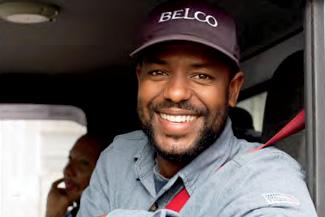

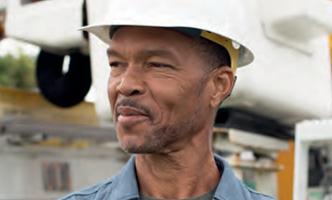
We understand that sustainability extends beyond the environment. We recognise that we have a social responsibility to our community and our team to develop and enact policies that support Diversity, Equity and Inclusion (DE&I). With a team of 234 employees, we strive to continuously evolve our DE&I approach to ensure every team member knows that they are valued; receives fair and equitable treatment; has a voice that can be heard; and has a place they know that they belong.
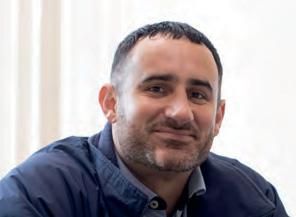
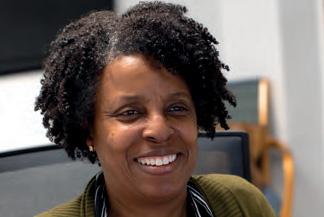
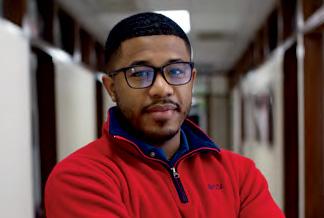

We’re excited to continue sharing our sustainable journey with you.
